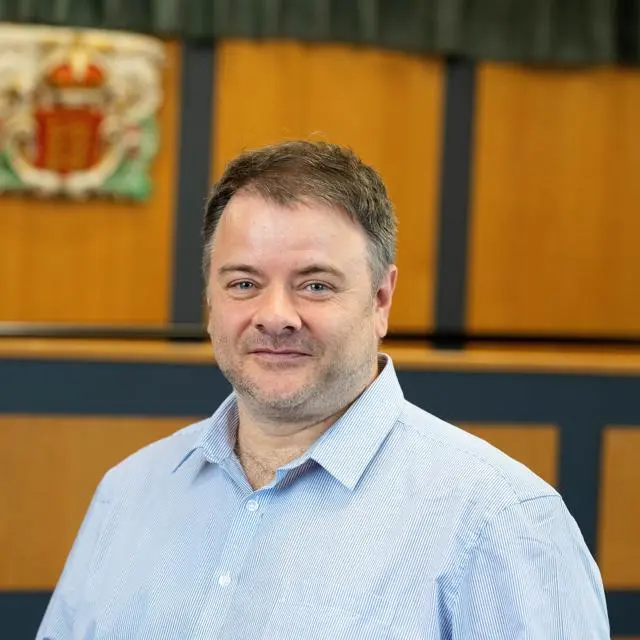Dr John Dempsey

John is Director of Cyber Investigations within the School of Law and Policing. He is also Director of the Cybercrime strand of the Criminal Justice Partnership. John has more than two decades of experience teaching digital investigation techniques to both undergraduate and postgraduate level students in Policing and Computer Science.
Digital systems are both pervasive and ubiquitous within modern society. For example, digital continued to function even when whole societies locked down during the covid-19 pandemic. Despite the importance of digital systems, they are open to misuse which could lead to harm. Digital/Cyber investigations typically involve the extraction, analysis and reporting of digital evidence.
John chairs the “Cyber Team steering group” which oversees the strategic direction of our Women in Cyber Security student chapter, Missing Person Investigation Unit and Cyber Clinic. These groups provide students with vital opportunities to develop real-world experiences they can add to their CV.
John has socially responsible attitude towards Computer Science and enjoys helping other people. While acknowledging the fantastic things that can be accomplished with digital technologies there will be times when computers are compromised, causing harm to people. Central to John’s teaching theme is that digital can be used to prevent harm, but also can be used investigate those that cause harm. His research has focused around helping young children (aged 7-11 years old) take a mindful approach to the disclosure of private information within an online setting.
- Principal Lecturer
- PhD, University of Central Lancashire, 2022
- MRes Child Computer Interaction, University of Central Lancashire, 2016
- Postgraduate Certificate in Computer Forensics and Investigations, Open University, 2011
- BSc (Hons) Software Engineering, University of Central Lancashire, 1997
- UCLan Vice Chancellor’s Award, Leading the way in modern learning, shortlisted 2023
- UCLan Golden Roses, Real World Learning Award, shortlisted 2022
- UCLan Golden Roses, Lecturer of the Year, shortlisted 2012
- UCLan Golden Roses, Personal Tutor of the Year, shortlisted 2014
- Digital Investigation
- Digital Intelligence
- Open Source Intelligence (OSINT)
- Privacy Enhancing Technologies
- Digital Safety
- Fellow of the Higher Education Academy (FHEA)
- Member of the British Computer Society (MBCS)
- Member of the Association of Computer Machinery (MACM)
- External Examiner, Portsmouth University 2020-2024
John is the Director of the Cybercrime strand of the Criminal Justice Partnership, and the Assistant Editor of the School of Law and Policing’s student journal “The Showcase”. He is Director of Studies for students researching the use of technology within “Missing Persons” investigations, and asset recovery from cryptocurrency.
The focus of Child Computer Interaction has been about the inclusion of children in the design process to improve their experiences of digital technologies in a positive way. One area that has largely been neglected, until recently, is the design process for online safety, including parental concerns and education. January 2021, the United Nations have adopted the “general comment 25” which describes the rights of children in relation to the digital environment which, among other things, says that children have the right to privacy while using the digital environment. John’s research is underpinned by the principle that children disclose too much information online, either to other people, or to 3rd parties such as businesses; and that once that information is disclosed it is impossible (or at least, really difficult) for that to be forgotten. Businesses may sell that data, the data may be processed to build profiles, and profiles may be targeted for advertising purposes/commercialisation. People may use that information for completely innocent reasons but may also use it for cyber-bullying or other evil purposes.
John developed a set of guidelines which help system designers develop privacy enhancing tools within their own computer systems. The guidelines provide principles which can be applied within different product contexts. Over 140 children were involved in a participatory design session that led to the development of the design guidelines; these design guidelines were then used by a professional designer before being tested/evaluated by another group of children.
While online child safety is John’s main concern, his other research interests include the use of technology within a digital forensic investigation. For example, he has researched the impact of “non-deterministic disk sectors” on the cryptographic hash functions that are commonly used to detect changes within digital evidence.
Use the links below to view their profiles:
- Cybercrime strand of the Criminal Justice Partnership
- Security and Forensic Research (SAFeR) in Computing
- Child Computer Interaction Group (ChiCI Group)
- Criminal Justice Partnership
- Crime Solutions, “Development of introductory distance learning course collaborating with Cyfor”, Co-Investigator, £5000, 2006
- Equipment Fund, “Digital Forensic Equipment”, Principle Investigator, £42,300, 2006
- Science and Technology Teaching and Learning Fund, “Develop a Capture the Flag (CtF) Competition”, Principle Investigator, £3000, 2019
- Lancashire Digital Life Research Centre, “AirSENSEI: A low cost network of air quality sensors for primary school pupils”, Principle Investigator, £2200, 2019
Telephone:+44 (0)1772 893307
Email: Email:Dr John Dempsey
Use the links below to view their profiles: